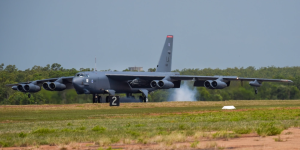Australia’s defense minister on Wednesday played down the significance of a major upgrade of B-52 facilities planned for northern Australia that has raised China’s ire, saying the nuclear-capable U.S. bombers have been visiting since the 1980s.
China this week condemned U.S. plans to deploy up to six of the long-range bombers at Royal Australian Air Force Base Tindal in the Northern Territory, arguing the move undermined regional peace and stability. China also warned of a potential arms race in the region.
Asked if the upgrade could prove too provocative, Defense Minister Richard Marles told reporters, “I think everyone needs to take a deep breath here.”
The multibillion-dollar U.S. investment is part of the Enhanced Air Cooperation Program, which has built on a range of air exercises and training activities between the two countries since early 2017.
“What we’re talking about is a U.S. investment in the infrastructure at Tindal, which will help make that infrastructure more capable for Australia as well,” Marles said.
“In terms of U.S. bombers, they’ve been coming to Australia since the 1980s. They’ve been training in Australia since 2005. All of this is part of an initiative which was established in 2017,” he said.
Australia would be a “significant beneficiary” of the Tindal upgrade, Marles said.
Some Australian critics argue the B-52s’ increased presence in northern Australia, made possible by the new facilities, would make the country a bigger target in a war between the United States and China.
Malcolm Davis, a senior analyst in defense strategy and capability at the Australian Security Policy Institute think tank, said China and other observers were “hyping” and “over-egging” the significance of what was proposed.
“This is not significant in terms of the hardware side of things. It is significant in terms of the strategic importance of the fact that we are now able to more easily support the U.S. in its operations in the region,” Davis said.
The U.S. Air Force would be able to operate B-52s for longer and with more ease from Tindal with an expanded parking apron, hangars, and fuel storage tanks, Davis said.
“It also means that in a crisis, Australia is then one of the few locations that the B-52s can more easily operate from to support U.S operational requirements,” he said.
Tindal, like the U.S. Pacific military bases in Guam, is within range of Chinese long-range missiles.
But the greater distance the missiles would have to fly makes Tindal an easier target to defend, Davis said.
Speaking during a visit to Thailand, Foreign Minister Penny Wong said governments led by both of Australia’s major parties “have worked to increase coordination and interoperability with the United States and with others.”
She said that contributes to “the strategic equilibrium” in the Asia-Pacific region, and the basing of B-52s “is consistent with the approach Australia has taken over a number of years to increase our capacity to operate with the United States.”
She said Australia welcomes increased U.S. involvement in the region under the Biden administration.
Wong said she hoped that deteriorating relations between Australia and China would improve.
“I’ve put the view publicly that we think it’s in both countries’ interest for the relationship to be stabilized,” she said.

































